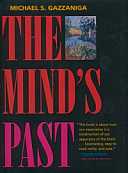formerly eScholarship Editions


|
|
|
|
Your search for
'Neuroscience' in subject
found 2 book(s). | Modify Search | Displaying 1 - 2 of 2 book(s) | |
| 1. |  | Title: The mind's past Author: Gazzaniga, Michael S Published: University of California Press, 1998 Subjects: Science | Psychology | Cognitive Science | Neuroscience Publisher's Description: Why does the human brain insist on interpreting the world and constructing a narrative? In this ground-breaking work, Michael S. Gazzaniga, one of the world's foremost cognitive neuroscientists, shows how our mind and brain accomplish the amazing feat of constructing our past - a process clearly fraught with errors of perception, memory, and judgment. By showing that the specific systems built into our brain do their work automatically and largely outside of our conscious awareness, Gazzaniga calls into question our everyday notions of self and reality. The implications of his ideas reach deeply into the nature of perception and memory, the profundity of human instinct, and the ways we construct who we are and how we fit into the world around us.Over the past thirty years, the mind sciences have developed a picture not only of how our brains are built but also of what they were built to do. The emerging picture is wonderfully clear and pointed, underlining William James's notion that humans have far more instincts than other animals. Every baby is born with circuits that compute information enabling it to function in the physical world. Even what helps us to establish our understanding of social relations may have grown out of perceptual laws delivered to an infant's brain. Indeed, the ability to transmit culture - an act that is only part of the human repertoire - may stem from our many automatic and unique perceptual-motor processes that give rise to mental capacities such as belief and culture.Gazzaniga explains how the mind interprets data the brain has already processed, making "us" the last to know. He shows how what "we" see is frequently an illusion and not at all what our brain is perceiving. False memories become a part of our experience; autobiography is fiction. In exploring how the brain enables the mind, Gazzaniga points us toward one of the greatest mysteries of human evolution: how we become who we are. [brief] Similar Items |
| 2. |  | Title: Passionate uncertainty: inside the American Jesuits Author: McDonough, Peter 1939- Published: University of California Press, 2002 Subjects: Religion | Christianity | Sociology | Neuroscience Publisher's Description: Founded by Ignatius Loyola in 1540, the Society of Jesus remains the largest and most controversial religious order of men in Catholicism. Since the 1960s, however, Jesuits in the United States have lost more than half of their members, and they have experienced a massive upheaval in what they believe and how they work and live. In this groundbreaking book, Peter McDonough and Eugene C. Bianchi draw on interviews and statements gathered from more than four hundred Jesuits and former Jesuits to provide an intimate look at turmoil among Catholicism's legendary best-and-brightest. Priests and former priests speak candidly about their reasons for joining (and leaving) the Jesuits, about their sexual development and orientation, about their spiritual crises and their engagement with other religious traditions. They discuss issues ranging from celibacy to the ordination of women, homosexuality, the rationale of the priesthood, the challenges of community life, and the divinity of Jesus. Passionate Uncertainty traces the transformation of the Society of Jesus from a fairly unified organization into a smaller, looser community with disparate goals and an elusive corporate identity. From its role as a traditional subculture during the days of immigrant Catholicism, the order has changed into an amalgam of countercultures shaped around social mission, sexual identity, and an eclectic spirituality. The story of the Jesuits reflects the crisis of clerical authority and the deep ambivalence surrounding American Catholicism's encounter with modernity. [brief] Similar Items |